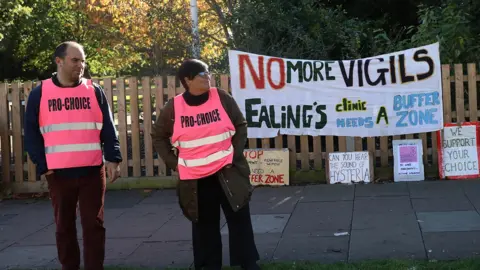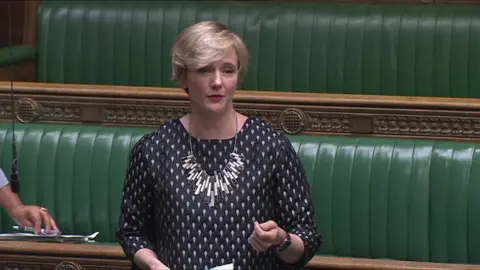MPs back abortion clinic buffer zone law
 Getty Images
Getty ImagesPlans to enforce buffer zones around abortion clinics in England and Wales have been backed by MPs.
Under the proposed law, harassing, obstructing or interfering with any woman attending an abortion clinic would become a criminal offence.
Protesters found guilty of breaching 150-metre buffer zones around clinics would face up to six months in jail.
Labour MP Stella Creasy said buffer zones protected "women accessing a very specific type of health care".
Ms Creasy, who proposed the new rules, said: "It does not stop free speech on abortion. It does not stop people protesting.
"It simply says you shouldn't have the right to do this in the face of somebody - and very often these people are right up in front of people."
Anti-abortion protests outside clinics in recent years have included displaying graphic images of foetuses, filming women and staff members and large gatherings singing hymns.
Some protesters have hung baby clothes around clinic entrances and called women "murderers" as they enter clinics, the British Pregnancy Advisory Service said.
The amendment to the Government's Public Order Bill, was approved by MPs by 297 votes to 110.
Former Prime Minister Theresa May and Leader of the Commons Penny Mordaunt were among those backing the buffer zones. Home Secretary Suella Braverman and fellow cabinet ministers Jacob Rees-Mogg and Kemi Badenoch voted against it.
The bill still has several stages to clear before becoming law, including scrutiny in the House of Lords.
As it now stands the bill would ban influencing, impeding or threatening, intimidating or harassing, advising or persuading, using graphic, physical, verbal or written means to inform attendees about abortion services.
Similar legislation has been proposed in Scotland.

Ms Creasy said: "Let's be honest, there's nobody praying outside the places you get a hip operation.
"There is nobody offering rosary beads or dead foetuses outside places you might go for an ankle injury.
"There is a time and a place to have that conversation, but it is not when you are dealing with vulnerable women".
Right To Life UK spokesperson Catherine Robinson said that if the amendment becomes law, as seems likely, "vital practical support provided by volunteers outside abortion clinics will be removed for women."
But the British Pregnancy Advisory Service (BPAS) said the amendment would protect women and healthcare workers from harassment.
BPAS chief executive Clare Murphy said: "Every year, around 100,000 women are treated by a clinic or hospital for an abortion that is targeted by anti-abortion protests.
"These groups attempt to deter or prevent women from accessing abortion care by displaying graphic images of foetuses, calling women 'murderers', and hanging baby clothing around clinic entrances, causing women significant distress. Today's vote will bring an end to this activity."
Ealing council established the country's first buffer zone around a Marie Stopes clinic in 2018.
Since then other councils have proposed similar schemes.
